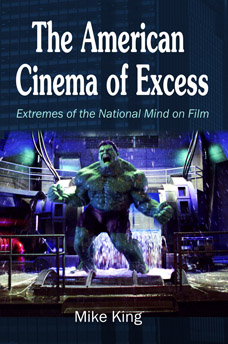

"…King offers an admirably penetrating and, as he promised, rigorous vision into the varieties of American excess leading to signature American forms of insanity. The rigor of his process consists of providing an excellent framework for understanding what he means by ‘cinema of excess’ and proceeding to show how various samples fulfill, in different degrees of success, the standards he sets."
Gregory Desilet, author of Screens of Blood: A Critical Approach to Film and Television Violence.
"King’s study will be of interest to scholars, teachers, and lay readers. ... Instructors could design a wide variety of courses in film studies and American studies around this text. Film buffs will find the discussion engaging, and it will deepen their appreciation of the cinema of excess."
Michael B. Mathias, Film-Philosophy.
"Mike King’s book is an important discussion of the American cinema of transgression and ‘madness,’ a self-diagnosed pathological condition, which explains excess in the world’s most influential film industry from the rare perspective of Greek drama, psychoanalysis and cultural studies."
Petra Rehling, author of Schöner Schmerz, a study of Hong Kong cinema.
Comments from Amazon:
"King’s methodological approach derives from an investment in Aristotle’s poetics and Aristotle’s description of the nature and purpose of drama. But where Aristotle’s poetics features tragic drama, King seeks to expand the poetics to include a broader range of dramatic offerings. He uses Aristotle’s criteria as a bridge to his own criteria for defining and evaluating extreme cinema."
Comments from Facebook:
...

Non-fiction, 2016 (2008), paperback (272 pages) or Kindle
Using the movies for insight into the American imaginary
This book develops a new critical framework for exploring the excesses portrayed in American cinema. The critical methods of both Left and Right are shown to have programmatic biases that make them unsuited to analysis of this transgressive material; instead a method of dramatic criticism is developed here based on Aristotle’s theory of tragedy and its cathartic possibilities. This framework is applied across a range of cinematic themes including paranoia, aggression, oedipal/Freudian themes, and cultural autism. Finally, a look at American sanity is provided through films where dramatic excess is balanced with critical awareness.